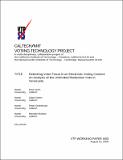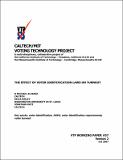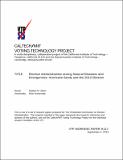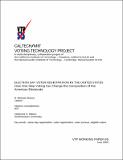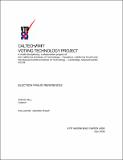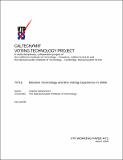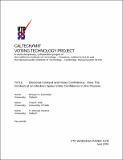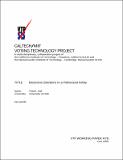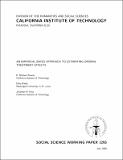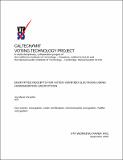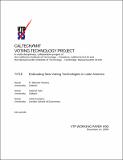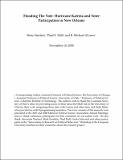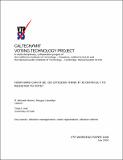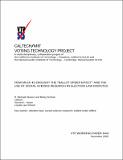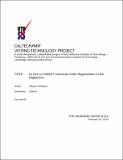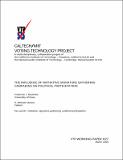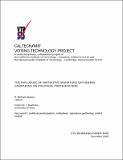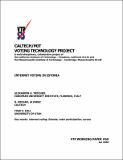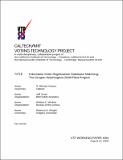Browsing Publications and Working Papers by Title
Now showing items 23-42 of 123
-
A Data-Centered Look at the Election of 2008
(Caltech/MIT Voting Technology Project, 2009-09-16)My expertise is in trying to use data to identify where election problems lie in America, especially at a broad level --- such as comparing states with each other or comparing counties with each other. I know that the ... -
Detecting Voter Fraud in an Electronic Voting Context An Analysis of the Unlimited Reelection Vote in Venezuela
(Caltech/MIT Voting Technology Project, 2009-06-23)Between December 2007 and February 2009, Venezuelans participated twice in constitutional referenda where the elimination of presidential term limits was one of the most salient proposals. Assuming voter preferences did ... -
The Effect of Voter Identification Laws on Turnout
(Caltech/MIT Voting Technology Project, 2007-10)Since the passage of the “Help America Vote Act” in 2002, nearly half of the states have adopted a variety of new identification requirements for voter registration and participation by the 2006 general election. There has ... -
Election Administration during Natural Disasters and Emergencies: Hurrican Sandy and the 2012 Election
(Caltech/MIT Voting Technology Project, 2013-09-04)The conduct of elections is constrained by a myriad of factors that vary greatly across the 3,000+ jurisdictions authorized to administered elections in the United States. Among these factors are anticipated and unanticipated ... -
Election Day Voter Registration in the United States: How One-step Voting Can Change the Composition of the American Electorate
(Caltech/MIT Voting Technology Project, 2002-06)For most Americans, voting requires two steps. First, an eligible citizen must register in some manner with an appropriate government agency. Second, once registered, the citizen can then cast a ballot on or before election ... -
Election Fraud References
(Caltech/MIT Voting Technology Project, 2006-07) -
Election Technology and the Voting Experience in 2008
(Caltech/MIT Voting Technology Project, 2009-03-25)The 2000 election brought the issue of voting machine performance to national attention. According to the Caltech/MIT Voting Technology Project (2001), up to 2 million votes were lost in 2000 owing to problems associated ... -
Electoral Context and Voter Confidence: How The Context of an Election Shapes Voter Confidence in the Process
(Caltech/MIT Voting Technology Project, 2009-04)A number of recent studies examine how confident voters are that their ballots are counted as intended in U.S. federal elections from 2000 to 2004. One consistent finding of these studies is that, relative to Democrats, ... -
Electronic Elections in a Politicized Polity
(Caltech/MIT Voting Technology Project, 2009-06)Since the 2000 presidential elections, the evolution of electronic technologies in American elections—from voting machines to computerized voter registries—has occurred within the context of a highly partisan, polarized, ... -
An Empirical Bayes Approach to Estimating Ordinal Treatment Effects
(Caltech/MIT Voting Technology Project, 2008-07)Ordinal variables — categorical variables with a defined order to the categories, but without equal spacing between them — are frequently used in social science applications. Although a good deal of research exists on the ... -
Encrypted Receipts for Voter-Verified Elections Using Homomorphic Encryption
(Caltech/MIT Voting Technology Project, 2005-09)Voters are now demanding the ability to verify that their votes are cast and counted as intended. Most existing cryptographic election protocols do not treat the voter as a computationally-limited entity separate from the ... -
Evaluating New Voting Technologies in Latin America
(Caltech/MIT Voting Technology Project, 2009-12-14)Having remained virtually unchanged since the enactment of universal and secret suffrage at the end of the nineteenth century, voting procedures are undergoing a radical transformation in many countries through the ... -
Flooding The Vote: Hurricane Katrina and Voter Participation in New Orleans
(Caltech/MIT Voting Technology Project, 2008-11-10)The flooding of New Orleans from Hurricane Katrina resulted in a massive and rapid exodus of individuals from New Orleans to locations around the United States. In the midst of the hurricane recovery, the City of New Orleans ... -
How Hard Can It Be: Do Citizens Think It Is Difficult to Register to Vote?
(Caltech/MIT Voting Technology Project, 2006-07)Political equality is seen as an intrinsic normative principle for the adequate functioning of a democratic republic. However, it is well documented that in the United States there are many qualified citizens who do not ... -
How Much is Enough? The "Ballot Order Effect" and the use of Social Science Research in Election Law Disputes
(Caltech/MIT Voting Technology Project, 2005-11)Previous empirical research and other related research from survey methodology holds that candidates listed first on an election ballot may gain some measure of advantage from this ballot placement. Using data from the 1998 ... -
In Line or Online? American Voter Registration in the Digital Era
(Caltech/MIT Voting Technology Project, 2014-02-18)Online voter registration is one of the most recent efforts to stimulate turnout in American elections. Within the past decade, an increasing number of states have begun to allow their residents to register as voters ... -
The Influence of Initiative Signature Gathering Campaigns on Political Participation
(Caltech/MIT Voting Technology Project, 2005-03-21)Does direct democracy increase political participation? Rather than focus on state-level effects of the initiative process, this paper studies the effect of signature gathering campaigns on participation within a state. ... -
The Influence of Initiative Signature Gathering Campaigns on Political Participation (II)
(Caltech/MIT Voting Technology Project, 2005-12-12)Does direct democracy increase political participation? Rather than focus on state-level effects of the initiative process, this paper studies the effect of signature gathering campaigns on participation within a state. ... -
Internet Voting in Estonia
(Caltech/MIT Voting Technology Project, 2008-01)Several countries have conducted Internet voting trials in binding public elections over the past decade, including Switzerland, the United Kingdom, and the United States. These trials have been conducted at the local and ... -
Interstate Voter Registration Database Matching: The Oregon-Washington 2008 Pilot Project
(Caltech/MIT Voting Technology Project, 2009-08-10)Voter registration databases maintain lists of registered voters that are used to determine who is and is not eligible to vote in an election. As such, accurate voter registration databases form a cornerstone of the electoral ...


